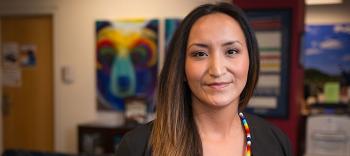Image Caption
Summary
On Friday, Sept. 29, at MacEwan University’s Robbins Health Learning Centre (10810—104 Ave. Edmonton) kihêw waciston Indigenous Centre hosts Elder Alsena White to share her story of her experiences at residential school through a circle and the presentation of the video “Gently Whispering the Circle Back”, commissioned by Blue Quills First Nations College.
The event begins at 9:30 a.m. and corresponds with Orange Shirt Day, held annually Sept. 29 to commemorate all the personal stories of loss suffered through the residential school system.
Orange Shirt Day was launched by Phillis (Jack) Webstad, who, in 1973 was heading into the school year at the Oblates of St. Joseph Residential School. Her grandmother let her pick out a new shirt for the first day of class. She picked a bright orange shirt which was taken from Phillis and replaced by a school uniform. The orange shirt came to represent how alone and worthless she felt during her time in residential school.
“Today, we wear it to show support that every child matters,” said Terri Suntjens, MacEwan University’s director of Indigenous Initiatives.
Suntjen’s father is a residential school survivor.
“He experienced abuse, and didn’t have an easy life there,” she says. “As the daughter of a residential school survivor and an Indigenous woman I see there is both intergenerational trauma that comes with grief and loss that my family experienced.”
Orange Shirt Day keeps the discussions on all aspects of the legacy of residential schools alive, and is an opportunity for First Nations, local governments, schools and communities to come together in the spirit of reconciliation and hope for generations of children to come, reads a press statement from MacEwan University.
Staff working with kihêw waciston will wear an orange shirt designed by Keely O’Dell, a first-year Theatre Production student whose brother Keestin works as a student advisor in kihêw waciston.
“When I was designing the orange shirts for MacEwan, I was thinking a lot about my grandparents—my kokôm and mosôm—who were both in residential schools,” said O’Dell. “It’s something I’ve grown up knowing about.”
O’Dell says a circle of sweetgrass in the shirt design represents the idea that healing is a continuous journey.
“My grandparents’ journey of healing continues on all the way from them to us. It makes me happy that people are finally acknowledging that these things happened and that it wasn’t okay. We can’t forget.”

